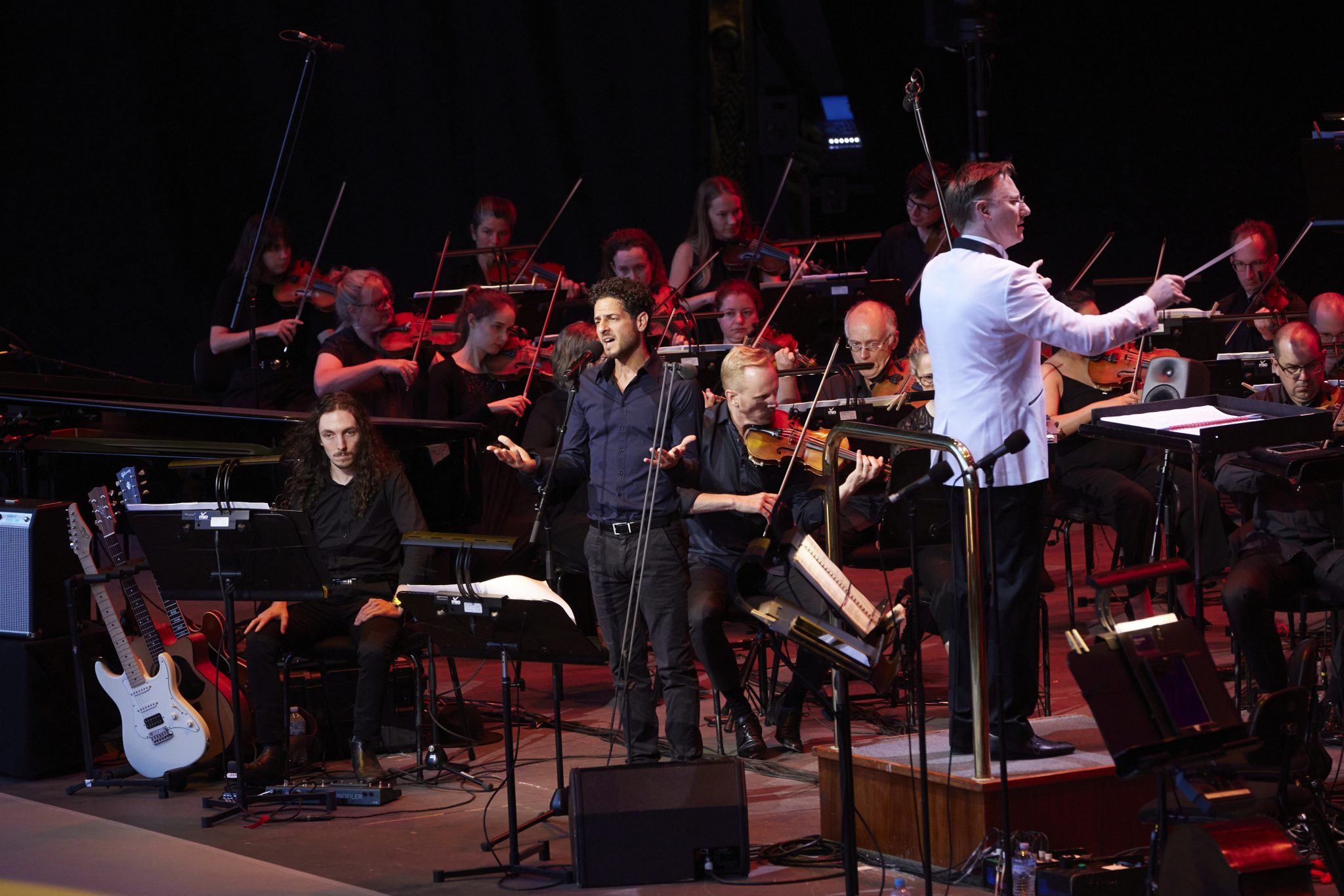From the enchanted awakening of ‘Sim Shalom – Grant Peace’ and the spiritual gravity of ‘Inna Rifqa – The Beauty Within’ to the transcendental ‘Avinu Malkeinu’ - 'Compassion' by Lior and Nigel Westlake is deeply profound.
The revelatory composition won the ARIA Award for Best Classical Album in 2014, but its influence has been felt across genres, faiths and cultures.
The seven-movement song cycle explores the themes of peace, wisdom, love, inner beauty, kindness, mercy, and compassion. ‘Eize Hu Chacham? – Who is Wise?’ is a riveting epic that demonstrates the ambitious, melodic and rhythmic intensity of the work. ‘La Yu’minu – Until You Love Your Brother’ is a sombre, graceful meditation that sounds sublime and sacred. ‘Al Takshu L’vavchem – Don’t Harden Your Hearts’ is a captivating percussive-driven movement while ‘Ma Wadani Ahadun – Until the End of Time’ is sweeping in its grand and evocative fervour.
Lior, Nigel Westlake, Emma Donovan, Paul Grabowsky, Billie Tumarkin, Alex Burkoy and the Melbourne Symphony Orchestra perform at the Melbourne Town Hall on September 29 at 7:30pm.
It started amid a period of pathological grief and led to an awakening. In the winter of 2009, Westlake held a fundraising concert for Smugglers of Light – a foundation that Westlake formed in memory of his son Eli – and Lior accepted the invitation to perform. It was Lior’s performance of the ancient Hebrew hymn of compassion, ‘Avinu Malkeinu’, that left a profound impact on Westlake and led to the discovery of a kindred musical spirit.
Westlake wanted to create a symphonic arrangement around Lior’s solo vocal performance. Through their beautiful collaboration, it grew into a seven-movement song cycle for voice and orchestra. Using the concept of compassion as the underlying theme, Lior sourced a combination of Hebrew and Arabic poems, proverbs and writings and devised vocal parts and melodic fragments to which Westlake created arrangements and orchestration around. The meeting of Lior’s gift for melody, lyrics and sublime voice with Westlake’s arrangements and orchestra led to a deeply affecting artistic partnership.
“It really did start from ‘Avinu Malkeinu’,” says Lior. “I had known of that hymn for quite some time and I was always taken by the melody, but when I was a bit older I looked into what it meant and discovered this beautiful central message that it entails, which is ‘instil me with a greater sense of compassion so that I can be liberated’. I just thought ‘oh wow, what a beautiful sentiment’ and this linking between the idea of being a more compassion person and a freer person – to me that was the beginning of this exploration of the whole idea of compassion. To me that’s a really universal message, which exists outside of any faith or belief.”
Having been born in Israel before his family moved to Australia when he was ten, Lior was familiar with many of the Hebrew Jewish writings and wanted to find complimentary texts from the Arabic Islamic tradition. Alain de Botton’s ‘Religion for Atheists’ was a seminal book for Lior who loved the sentiment of bringing the beauty of religion’s influence – particularly in relation to the wisdom of compassion – and its contributions to philosophy and art into a secular space. This was driven by the belief that one could immerse themselves in these beautiful writings without subscribing to a certain faith.
“I think a strength of this work is it does exist in two ancient languages that most people hearing it don’t understand,” says Lior. “I think that works to its favour in the sense that it draws them in with this synergy that Nigel and I have and the beautiful orchestration. But it also lets you have enough freedom to interpret it in your own way and imbue your own meaning and experiences into the work. That’s why it’s resonated deeply.”
It was Westlake who convinced Lior to sing both the Hebrew and Arabic despite being only fluent in the former. “I do have to thank Waleed Aly who was a big help in getting me to pronounce things more accurately and go through the meaning of them and give me some context and background,” says Lior. “Also speaking to my father – he was born in Iraq, an Iraqi Jew and Arabic was actually his mother-tongue – so he reminded me that there is a history there in the family and I should dive in and embrace it.”
“I was more interested in poems and proverbs rather than diving into the scriptures and uncovering texts that really focused on compassion between human beings,” says Lior. “It was really about how we treat each other and finding commonalities between these two worlds. I cast a net pretty far and wide to really try and uncover beautiful proverbs and poems and by their nature certain words kind of trigger melodies. I uncovered some beautiful texts, but when I was singing them, they didn’t sound very lyrical. It was a bit of a puzzle that I was trying to put together. I would uncover a proverb and sing the melody and Nigel was quite insistent that he only wanted me to sing it a cappella. The fact that he could have received these a cappella melodic fragments and created these incredibly rich orchestral worlds around it just blows me away.”
The first time that Lior performed Compassion with the Melbourne Symphony Orchestra was at the Sidney Myer Music Bowl in 2014. “Seeing the way it resonates with such diverse audiences has really blown me away,” says Lior. “Diversity in age, but also diversity in their level of religiosity – from secular people and atheists to people who are devout in some faith. It seems to have resonated in quite a deep way, so that inspires you. It feels very purposeful. I’ve been wanting to perform with the Melbourne Symphony since, especially in an indoor setting, where you get a much clearer scope of the detail in the orchestra just by nature of the acoustics. FOJAM are such a dynamic and progressive Jewish arts organisation that really refrain from insularity and look outside to the wider world and having amazing artists like Emma Donovan, Paul Grabowsky, Billie Tumarkin and Alex Burkoy – it does feel like a coming together of a very special group.
“Nigel and I are working on a follow-up piece at the moment, which will be something completely different – a work which explores the life of an amazing Indigenous activist, William Cooper,” says Lior. “I’m always writing songs and heading towards another solo album. Along with my singer-songwriter stuff, I do like to diversify and work on other projects as well. I just follow my musical curiosity and that’s where it takes me.”
Lior, Nigel Westlake, Emma Donovan, Paul Grabowsky, Billie Tumarkin and Alex Burkoy and the Melbourne Symphony Orchestra perform at the Melbourne Town Hall on September 29 at 7:30pm. For tickets, head here.
This article was made in partnership with FOJAM and the MSO.

